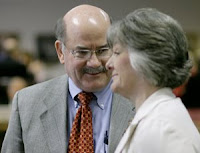
I was listening to CBC Radio’s
The Current coming in yesterday morning. They were
talking about Twitter, and in particular, its use in political circles. Stephen Marche may have had the best one-liner when he said something like, “I’m not a fan on instant thinking.”
I agree with that. I’m not a fan of instant thinking, either. Since I’m on Twitter now, this raises the question: Why?
The original reason I started Twittering was to provide an easy way for students to figure out where I was. But as I’ve used it more, it’s become more like mini-blogging. I try to put out more substantial stuff on Twitter than I did at first. Pointing out a cool article might have got a short blog post before, but now it gets a tweet.
But in both blogging and twittering, the reason I do it is, in my mind, that I want to take on the responsibility of being a public intellectual. Not always easy, especially considering that “intellectual” is an insult to some people’s thinking.
Plus, I would add that for some people, writing is a way of thinking. I’m not arguing that I’m working on my next research paper through Twitter, but there is something to be said for practicing being concise. Saying the most you can in the least space requires discipline.
Now that I think about it, a lot of scientists
should twitter more, because it might help them write things like “now” instead of “at this point in time,” or “can” instead of “has been shown to be capable of,” and so on.
Additional: A
good post on “Why should scientists blog?”
Incidentally, I think I am the only active blogger out of my entire department. Maybe several science departments in our university.
 SYWKQCAFNAVSCFamide?!
SYWKQCAFNAVSCFamide?!
















